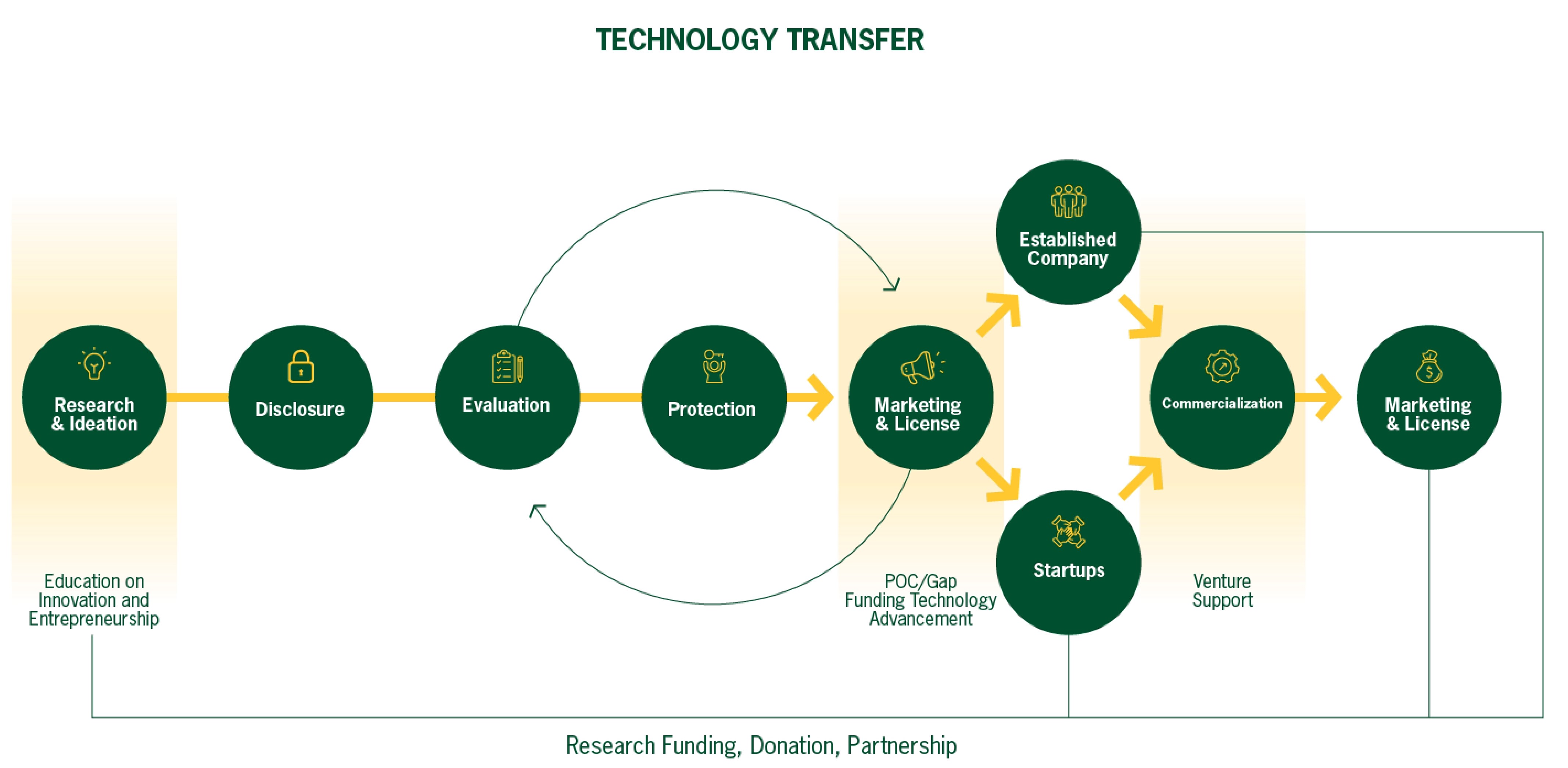Innovation
For Researchers
ORPI comprises professional staff who are dedicated to supporting researchers focused on commercial applications of their research and contributing to the University’s innovation and entrepreneurial ecosystem. Supports are provided to help you commercialize and license your research, while protecting your intellectual property.

- Pre-Incubation Programming (co-management services, GATE Startup Bootcamp, etc.)
- Accelerator Partners (e.g., Cultivator, Startup TNT, Ag-West Bio)
- Ecosystem Pathfinding (e.g., Ecosystem maps or searchable database)
- Industry Liaison – within private and public sectors, as well as tech ecosystem
Entrepreneurial Training Programs & Supports
Educational Resources & Business TemplatesFunding Sources for Partnerships
Funding sources for partnerships can be non-dilutuve or dilituve in nature.
- Innovation Saskatchewan - The Saskatchewan Advantage Innovation Fund (SAIF), The Agtech Growth Fund (AGF), The Made-in-Saskatchewan Technology (MIST) program
- PrairiesCan Development - Business Scale-up and Productivity (BSP), Strategic Innovation Fund (SIF), Regional Quantum Initiative (RQI)
- ElevateIP program administered through North Forge
- National Research Council (NRC) IRAP - IP Assist, Industrial Research Assistance Program (NRC IRAP), Industrial Research Assistance Program
- Natural Resources Canada (NRCan) - Critical Minerals Infrastructure Fund, Energy Innovation Program, Investments in Forest Industry, Smart Renewables and Electrification Pathways Program, Alliance Advantage
- AgWestBio - Advisory Input
- Sustainable Development Technology Canada (SDTC) - Seed Fund
- Mining Innovation Commercialization Accelerator (MICA)
- Canada Foundation for Innovation (CFI) - Bioscience Research Infrastructure Fund (BRIF), Innovation Fund, College Fund, Major Science Initiatives (MSI) Fund, Exceptional Opportunities Fund (EOF), John R. Evans Leaders Fund
- NSERC Ideas 2 Innovation Grant - Lab to Market, College and Community Social Innovation Fund, Synergy Awards for Innovation
- Strategic Innovation Fund
- Mitacs
- Scientific Research and Experimental Development (SR&ED) tax incentives - CRA
- Agriculture and Agri-Food Canada
- Innovation, Science and Economic Development Canada (ISED) - Strategic Innovation Fund
- The Sustainable Canadian Agricultural Partnership (Sustainable CAP) - AgriInnovate Program, AgriScience Program, AgriMarketing Program, AgriCompetitiveness Program
- Circle Innovation - Health Tech SME Program
- Agriculture and Agri-Food Canada - Agricultural Clean Technology Program - Research and Innovation Stream
- Innovation, Science and Economic Development Canada (ISED)
- Canadian Institute of health Research: Funding Opportunities
- Governor General’s Innovation Awards
- Innovation for Defence Excellence and Security (IDEaS)
- Innovation Solutions Canada
- Mentor Networks: Canadian Government and Small Business
ORPI is here to help researchers pathfind through a multitude of non-dilutive investment sources. There are many different types of funders, who operate in different markets, industries and work with companies at different stages of growth. ORPI staff have experience dealing with non-dilutive funding sources and have relationships with local investors Conexus Venture Capital and Emmertech, as well as many others across Canada and beyond.
For Companies
ORPI is your portal for industry engagement and access to the university’s impressive and evolving intellectual property portfolio. We work with companies of all sizes, from different industries and countries, to find ideal innovations and research partners to meet their needs.
The University of Regina works closely with public funding agencies such as NSERC, NRCan, and Mitacs, and has the ability to lever industry sponsorships with matching grants and tax credits to support applied research and commercialization projects. ORPI offers administrative support to turn early-stage discoveries into market ready technologies, including sponsored contract R&D and patent licensing.
The ORPI team can help build connections to leading researchers, support fundraising and risk management, and offer fair and equitable agreements to partners. Please contact us if you’re interested in exploring work with a suitable university researcher, or may want to access licensing opportunities.
Technologies available to license
Signature Research Areas
